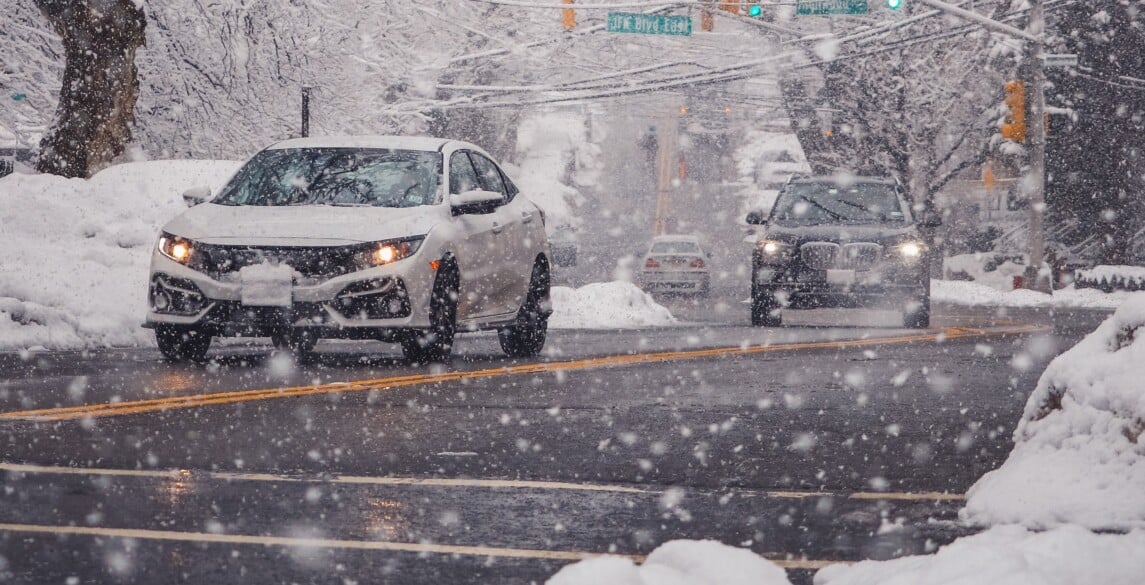How to Winterize Your Car For the Cold Season
Follow these important steps to winterize your car and ensure it stays at peak performance all winter long.

Winter can be a tough season for cars. Cold temperatures, snow and ice, and salt on the roads can all take a toll on your vehicle. That’s why it’s important to winterize your car to make sure it’s ready to handle the harsh winter weather. This is particularly true for cars, like a convertible, that may sit idle until spring arrives. Here are some important steps you can take to winterize your car and ensure it stays at peak performance all winter long.
Tips for Winterizing Your Car for Cold Weather
Check your fluid levels
One of the most important things you can do to winterize your car is to make sure all of your fluid levels are topped off. This includes your engine oil, transmission fluid and brake fluid. Cold temperatures can cause these fluids to thicken and become less effective, so it’s important to make sure they’re at the correct levels.
Inspect your tires
Your tires are the only point of contact between your car and the road, so it’s important to make sure they’re in good condition. Check the tread depth and make sure it’s at least 3/32 of an inch. If your tread is worn down, consider getting new tires. You may also want to consider using winter tires, which are specifically designed to provide better traction in snow and ice.
Test your battery
Cold weather can be tough on car batteries, so it’s a good idea to have it checked before the winter season begins. Make sure the battery is charged and in good condition. You may want to consider replacing it if it’s more than three years old. You should also check the battery terminals to make sure they are clean and tight.
Check the brakes
The brakes are an essential safety feature on your car, and they need to be in good shape to function properly. Check the brake pads and rotors to make sure they are in proper condition and replace them if necessary.
Change the oil
Depending on your car, you need to change the oil in your car every 3,000 to 5,000 miles. In the winter, it’s a good idea to use a synthetic oil that has a lower viscosity. This type of oil is better able to flow in cold temperatures and can help to prevent engine wear.
Inspect the antifreeze
The antifreeze in your car’s radiator helps to keep the engine from freezing in cold temperatures. Make sure the antifreeze level is at the proper level and that the mixture is correct (usually a 50/50 mix of antifreeze and water).
Look over the wiper blades
Wiper blades can become worn out over time and may not function properly in the winter. Replace the wiper blades if they are worn or damaged, and make sure to use a winter wiper fluid that won’t freeze.
Test the heating and cooling system
Make sure the heating and cooling system in your car is in good working order. Check the heater and defroster to ensure they are functioning properly, and have the system checked by a mechanic if you notice any issues.
Ensure the lights work
Make sure all the lights on your car are in good working order, including the headlights, taillights, turn signals, and brake lights. Not only are functioning lights important for safety, they are also required by law.
Check the belts and hoses
Belts and hoses can become brittle and crack in cold temperatures, so it’s important to have them checked and replaced if necessary.
Storing Your Car in a Full-Service Warehouse
Wondering if you have time to keep up with all these maintenance items for a car you won’t be driving until warmer weather arrives? You may want to consider storing your car at a warehouse, especially one that has mechanics on staff to address each of these tasks.
Should you decide to go this route, make sure you choose the right storage facility for your car. (We outline all the questions you should ask when choosing a vehicle storage facility here!)
Hilldrup Offers Full-Service Car Storage and Maintenance in Fredericksburg, VA
Hilldrup’s vehicle storage facility in Fredericksburg, VA, offers a full range of maintenance options for your car all year round. Beyond full-service maintenance for cars, we also can accommodate larger vehicles like RVs and boats while they’re not use! Learn more about our vehicle storage capabilities here!


